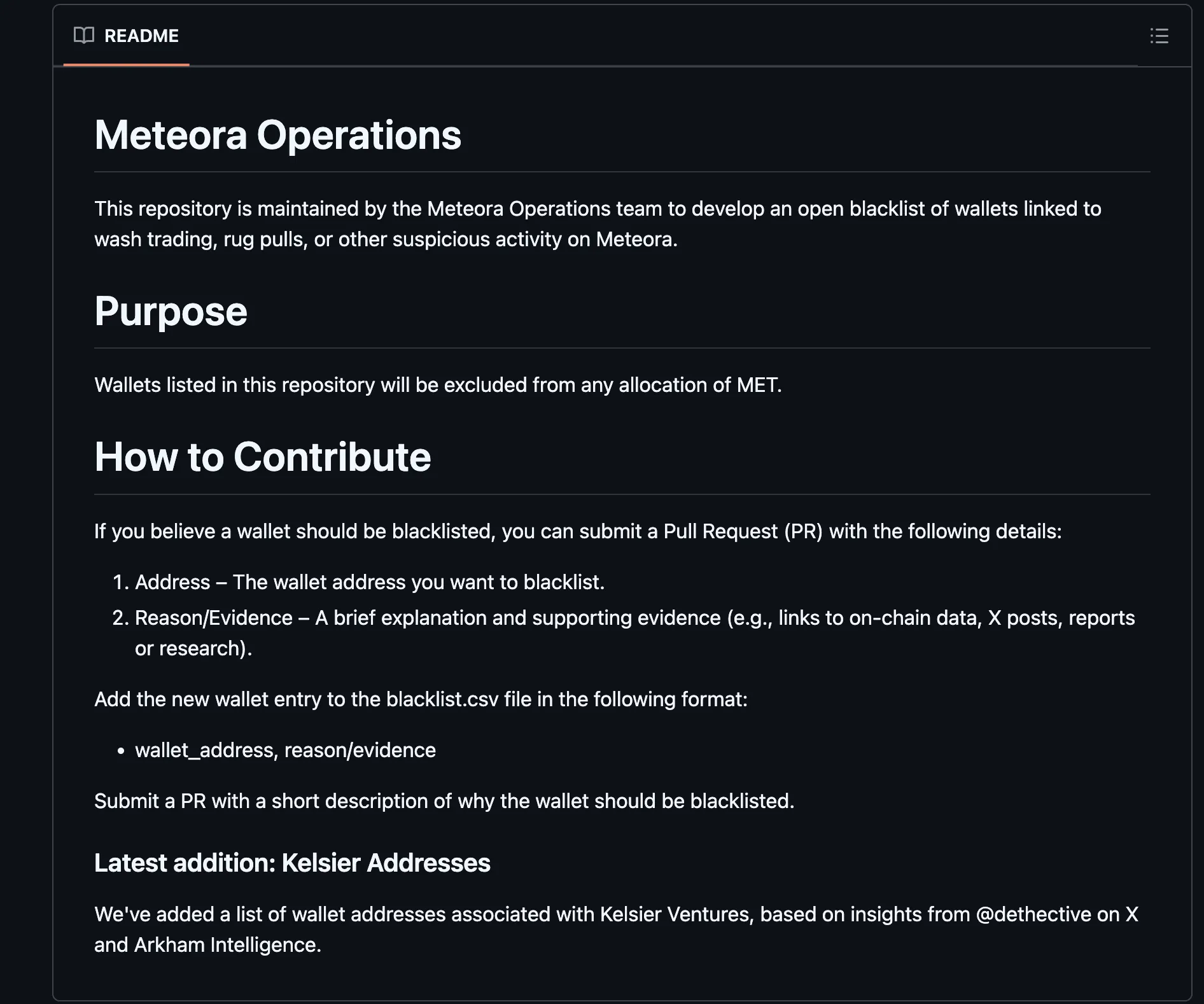If you’re into crypto, you’ve probably heard of Meteora, a big name in the Solana ecosystem known for its secure and optimized yield layer. On March 21, 2025, Meteora shared an exciting update on X that’s got the community buzzing: they’re launching a community-driven blacklist to protect their MET token from bad actors like wash traders and wallets linked to shady entities like Kelsier Ventures.
What’s the Big Deal?
Meteora’s main concern, as voiced by their community, is ensuring that MET—a token tied to their liquidity provider (LP) Stimulus Plan—doesn’t end up in the wrong hands. Wash trading, for those new to crypto, is when someone artificially inflates trading volumes by buying and selling the same asset to create a false sense of demand. It’s a sneaky tactic that can harm the integrity of a token. Kelsier Ventures, mentioned in the post, has been flagged in crypto circles as a market maker involved in potential scams, with reports from ChainCatcher in February 2025 highlighting their controversial activities.
To tackle this, Meteora is creating an open, verifiable blacklist of wallet addresses. These wallets will be excluded from receiving any MET allocations, ensuring a fairer distribution for genuine users. It’s a proactive step to maintain trust in their ecosystem, especially since Meteora handles a massive $414 million trading volume, according to crypto.ro.
How Does It Work?
The blacklist isn’t just Meteora working alone—they’ve teamed up with industry leaders like Bubble Maps and RugCheck.xyz, which are known for spotting suspicious activity in crypto. Anyone can submit wallet addresses they suspect of abuse, but there’s a catch: you need to provide solid evidence, like on-chain data, X posts, or reports. This keeps things transparent and prevents random accusations.
You can check out the blacklist and submission guidelines in a public GitHub repository linked in the post here. The process involves adding wallet addresses to a blacklist.csv file with a reason and evidence, then submitting a pull request (PR). It’s a community effort, which is pretty cool if you think about it—everyone gets a say in keeping the ecosystem safe.
Why This Matters
This initiative ties into Meteora’s broader LP Stimulus Plan, which rewards liquidity providers with MET tokens to boost activity on their platform. But with big rewards come big risks, like people trying to game the system or exploit airdrops (free token distributions). Some users in the thread, like @liberlitas41, even warned about random wallets being spammed for airdrop percentages, referencing past issues with projects like LayerZero.
By involving the community and partners, Meteora is trying to stay ahead of these risks. The post also mentions adding wallets linked to Kelsier Ventures, based on insights from @dethective on X and Arkham Intelligence, a platform for crypto analytics. It’s a clear signal that Meteora is serious about protecting MET and maintaining its reputation.
What People Are Saying
The response on X has been mostly positive. Users like @vitalizing_ and @GusstavOsP cheered with “amazing to see” and “LFG” (Let’s Go!), showing excitement for the initiative. Others, like @katexbt, praised the shoutout to @dethective but raised a good point: why not offer rewards for people helping build the blacklist, similar to how the IRS offers bounties for snitching? It’s a fair question that could make the program even more effective.
There’s also a quirky mention in the thread about someone accidentally clicking on @DanbtcTrade and making $525k trading with their signals. While interesting, it feels a bit off-topic and unrelated to Meteora’s announcement—probably just someone promoting a trader!
A Look at the Blacklist in Action
The post includes a screenshot of the GitHub repository’s README, showing how the blacklist works. Here’s what it looks like:
It outlines the purpose (excluding bad actors from MET allocations) and step-by-step instructions for contributing. This transparency is key for building trust in a decentralized space like crypto.
Final Thoughts
Meteora’s community-driven blacklist is a smart move to protect MET from wash traders and entities like Kelsier Ventures. It’s a great example of how crypto projects can work with their communities to solve problems, especially in a space where scams and bad actors are all too common. If you’re into crypto or just curious about how projects like Meteora operate, this initiative is worth keeping an eye on.
Whether you’re a trader, investor, or just a crypto enthusiast, staying informed about these efforts can help you navigate the wild world of digital assets more safely. Check out the repository, follow Meteora on X, and join the conversation—your input might just help shape the future of MET!



